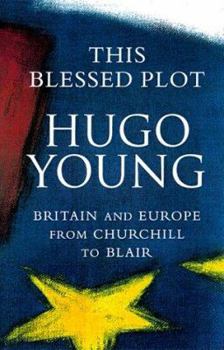This Blessed Plot: Britain and Europe from Churchill to Blair
Select Format
Select Condition 
Book Overview
Originally published in 1998. Describing Britain's troubled relationship with Europe and the issues which have remained unanswered since the end of the Second World War. Queries whether Britain is a... This description may be from another edition of this product.
Format:Hardcover
Language:English
ISBN:0879519398
ISBN13:9780879519391
Release Date:May 1999
Publisher:Overlook Books
Length:543 Pages
Weight:2.15 lbs.
Dimensions:2.1" x 6.4" x 9.5"
Customer Reviews
2 ratings
Brilliant, biased account of EU
Published by Thriftbooks.com User , 23 years ago
Hugo Young of the Guardian gives us a fascinating and revealing portrait of Britain's relations with the European Union. He is passionately committed to the European Union, but his book presents much information very useful to those who oppose it.He recounts that in the 1971-72 Parliamentary debates, "Ministers did not lie, but they avoided telling the full truth. They refrained from stating categorically that the law of the European Community would have supremacy over British law." "Nor did ministers state that the European Communities Act would be, in practice, irrevocable." "Enthusiasts for entry, as we have seen in the cases of Edward Heath and Geoffrey Howe, felt it prudent to mask the radical nature of the transaction they were proposing." He cites Howe's admission that the Government concealed much from Parliament. And he recalls that a Government lawyer said, "Open admission of what was being done to parliamentary sovereignty would be `so astounding' as to put the whole Bill in danger." None repeated the clarity of Foreign Secretary Lord Home when he told the Lords in August 1961: "let me admit at once that the Treaty of Rome would involve considerable derogation of sovereignty." Its consequences would, he said, be "different in kind from any contract into which we have entered before."EU supporters said that EC entry would bring economic growth. When it didn't, they said the Single Market would. When it didn't, they said the Exchange Rate Mechanism would - Young remarks, with considerable under-statement, "The story of the ERM was not an entirely happy one." When that failed, bringing the worst slump for sixty years, they said that the euro would bring growth.He presents the real issue: "The serious case, surely, is ... about national control over big decisions. The EU renders collective a decision-making process, in some areas, that was once exclusively national." Entering the euro would end our national democratic control over policy: is this what we want?
Interested in Europe's future? This is a book you must read
Published by Thriftbooks.com User , 26 years ago
"A history of Britain's relations with Europe since 1945 as seen by the country's leadership. Thoroughly researched, powerfully written, intense and passionate. A book of the decade, not just the year" -The Economist






